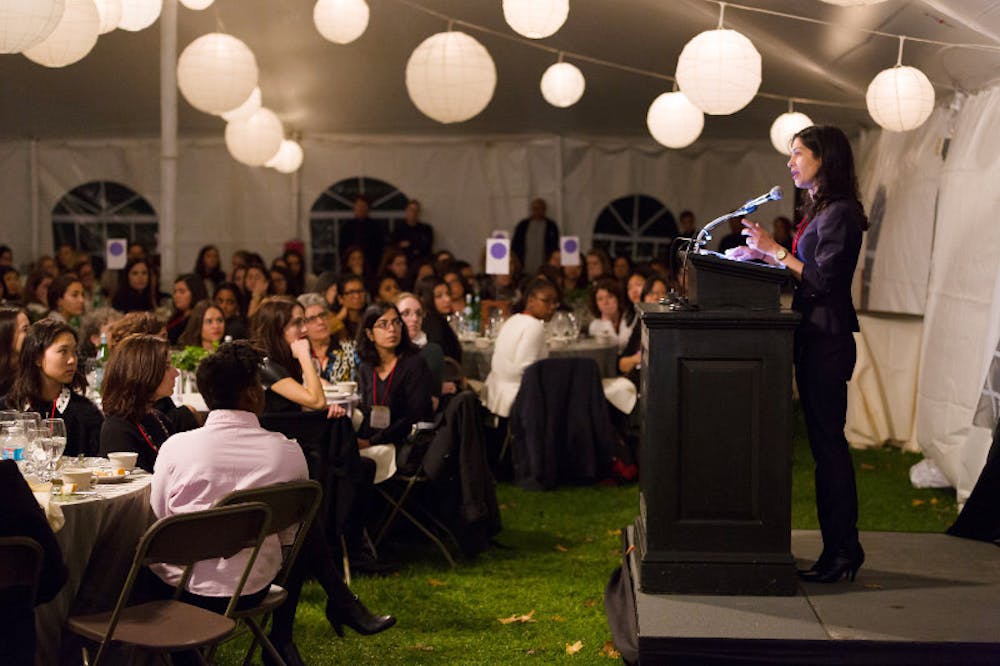The Diversity and Inclusion Action Plan, released by President Christina Paxson P’19 in February, includes the intention to create and expand upon mentoring resources at Brown for students of color, LGBTQ+ students and first-generation college students.
The document refers to Women’s Launch Pad, a mentoring program that connects female-identifying alumnae to women in their senior year at Brown, as a model for the new mentoring resources. The program is a collaboration between the student group Women in the World, the presidential advisory board and the Women’s Leadership Council, which consists of alums and parents of students.
The WLC, founded under former President Ruth Simmons, was founded in 2004 to give members the opportunity to be paired with individual students and offer guidance about careers and life after graduation. The mentors and mentees meet a minimum of six times between October and April, and one of those meetings has to be in person.
The Office of Institutional Diversity and Inclusion has “been working with a sub-committee of the DIAP implementation working group to more fully understand the scope of the mentoring resources that are available to students, faculty (members) and staff (members),” wrote Liza Cariaga-Lo, vice president for academic development, diversity and inclusion, in an email to The Herald.
The working group will be looking at both existing mentoring program models as well as those at peer institutions, Cariaga-Lo wrote.
The Office of Institutional Diversity and Inclusion will work to recruit and “more fully engage a broad array of mentors, including alumni, graduate students (and) staff” for both undergraduate and graduate mentees, Cariaga-Lo wrote.
For example, the two year-old First-Gen Mentorship Program has recently expanded to offer paid program coordinator positions for students, said Alexis Rodriguez-Camacho ’18, one of the current coordinators and a mentee.
The first-gen program has not been modeled on the WLP, but the budding program has similarities with WLP, he added.
This year, there were 32 mentors for 23 mentees. The mentoring relationships are currently between underclassmen and upperclassmen, and the pair of undergraduates are matched with a graduate student. The program looks to expand and match undergraduates with alumni and faculty members as well, Rodriguez-Camacho said.
The hope is to create “mentorship families,” which would consist of groups of mentees being paired with graduate students and faculty members, he added.
So far, WLP and the First-Gen Mentorship Program have received positive feedback from both mentors and mentees.
“As a sophomore, there were a lot of personal and academic hurdles that I had to go through,” Rodriguez-Camacho said. “Having a first-gen mentor who had gone through those experiences … was reassuring. We meet at least every week over lunch and talk about summer opportunities, how our families back home are doing or how our own personal mental health is.”
WLP co-chair Sharon Curhan ’83 expressed how much she would have appreciated having WLP as a resource while she was a student at Brown.
“The transition after college was so daunting, confusing, overwhelming and full of so many questions, decisions and unknowns. It would have been wonderful to have the support and guidance from an understanding Brown woman to help me find my way,” she wrote in an email to the Herald.
The DIAP’s proposed mentoring programs aim to address the unique issues women, minorities, LGBTQ+ and first-generation college students face at Brown.
“When I first came on campus and I was looking for a summer internship, my professor asked me to start by asking my parents and to ‘tap into my network,’” Rodriguez-Camacho said. “Ultimately, the mentoring program offers access to a larger social network.”
Mentoring programs also provide support from those who have been through the college process already and can provide insight.
“The WLP program helps Brown to tap one of its greatest human capital assets — its alumni — to provide a service that its students might value most,” wrote Johanna Hussey, Assistant Director of Engagement Programs for the WLP, in an email to The Herald.
WLP matches students to mentors based on their individual demographics and needs, including concentration, career field, post-graduation plans and race or ethnicity, she said. “The program provides whatever tools the student is in need of to help her prepare for a successful transition to life after graduation,” Hussey wrote, adding that the program offers workshops and gatherings throughout the year.
Correction: A previous version of this article stated that the Women's Leadership Council was founded in 2006. In fact, it was founded in 2004. The Herald regrets the error.





